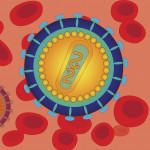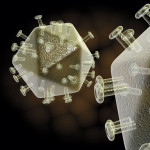An early study of a genetic therapy has reduced the size of the HIV reservoir in seven out of nine study subjects and has also led to long-term CD4 increases. The biotech company Sangamo BioSciences presented the findings of its Phase I trial of the treatment, called a ZFP Therapeutic, at a conference titled “What Will It Take to Achieve an AIDS-Free World?” in San Francisco.
The open-label trial involved nine people with HIV who, despite ongoing antiretroviral (ARV) therapy and fully suppressed viral loads, did not restore their CD4 levels to 500 or above. Researchers removed immune cells from the participants and genetically engineered them knock out genes that express the CCR5 coreceptor onto which HIV latches in order to infect the cell, thus yielding HIV-resistant CD4s without the coreceptor. Participants received a single infusion of these cells, which constitute a treatment known as SB-728-T. They remained on ARVs throughout.
As a result of the therapy, seven out of nine of the participants experienced a reduction in HIV DNA one year after the infusion, indicating a diminished viral reservoir. The therapy also led to a median long-term increase of 103 CD4 cells among all participants, which was correlated with an increase in the modified CD4 central memory cells—cells which themselves continued to produce HIV-resistant, CCR5-modified CD4 cells.
To read a Sangamo BioSciences release, click here.
Advertisement
Advertisement
Advertisement






1 Comment
1 Comment